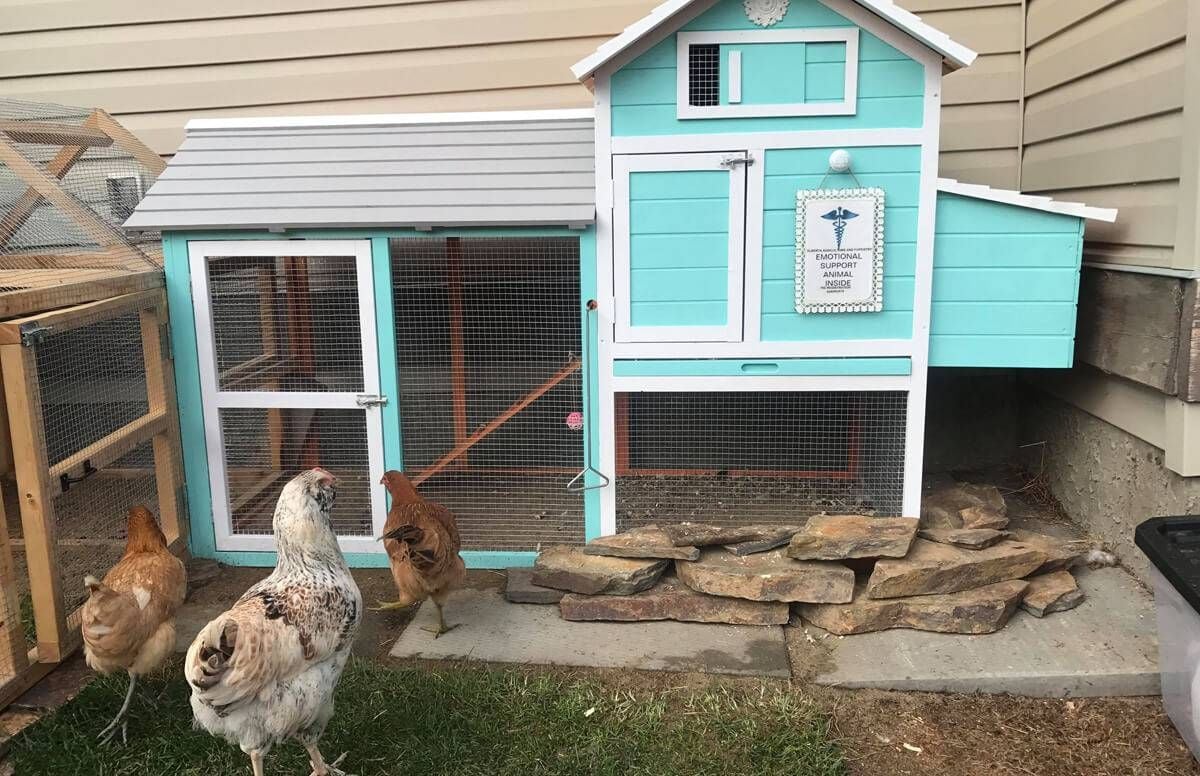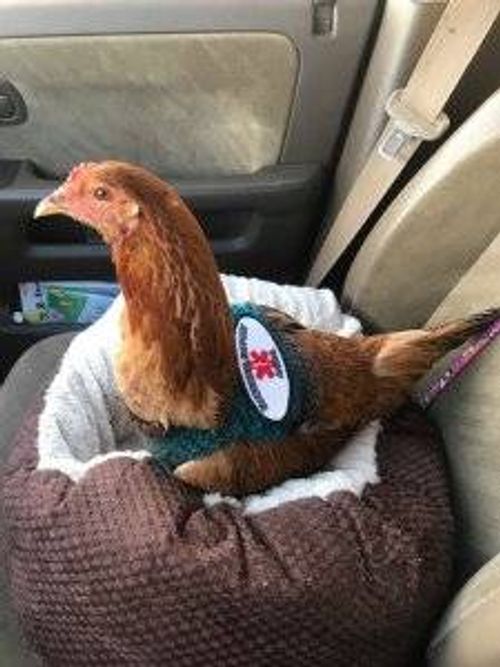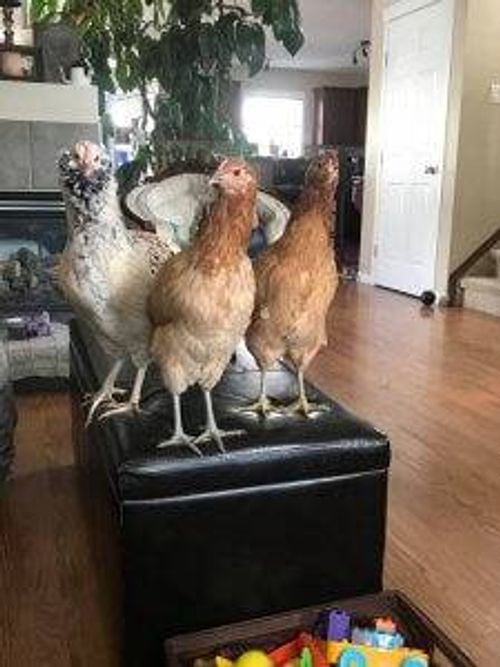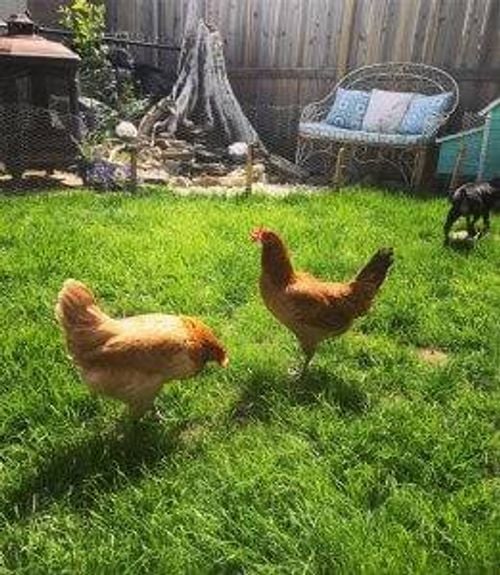The Calming Effect of Therapy Chickens
How the popular birds can offer mental health benefits to older adults
Chickens. They’re an important part of the agricultural economy, as well as our food chain. But to many people, they’re much more than a main course at dinner. Today, chickens are being widely used as therapy animals across the United States, Canada and the United Kingdom.

While it may come as a surprise to some, chickens offer significant therapeutic benefits for people of all ages and are proving a powerful therapeutic tool for those suffering from anxiety, depression, isolation, loneliness and dementia.
Chickens Can Be Calming
For Nikki Pike, of Calgary, Alberta, her three hens Nugget, Noodle and Nibble have changed her life. As a child, Pike endured sexual abuse, escaping to her backyard where her mom’s hens kept her company. The chickens helped her cope with the abuse and Pike developed a strong bond with the animals. Fast forward to today, and Pike suffers from severe anxiety that limits her life and affects her husband and two young boys.

When Pike decided to host three young chicks for a weekend, her goal was simply to give her boys a fun experience, but she and her husband soon realized that the chickens were a therapeutic outlet for Pike.
“As soon as we brought the hens into our home, we realized that they helped me with my anxiety and depression,” she said. “My family noticed in just the two days that we had the chickens that I was happier.”
Before bringing chickens back into her life, Pike had daily, severe anxiety attacks.
“The only way I could cope was to medicate myself,” she said. “With the chickens, I was able to be a better person. I found it easier to get through the day, and was excited to get up, go out, and be active. I felt calmer and happier.” Having chickens to care for has reignited the bond Pike experienced as a child and has drastically reduced her medication needs.
Pike was asked to explain how the chickens reduce her anxiety. “There is a sensory benefit to having the chickens — the feel, smell and sound of them calms me down and brings my heart rate down, helping to level my breathing,” she explained. “The result is that I’ve had fewer anxiety attacks. I don’t have to carry rescue medication all the time and am lessened by the amount of anxiety I experience on a day-to-day basis. Holding, smelling and feeling the hens brings me to a calm place.”
A Link to the Past
Perhaps it’s this sensory connection, or a bond to the past that makes chickens such a strong therapy animal for older adults.
In 2015, a news report described a patient at a nursing home in Gateshead, England who “was very agitated and kept repeating certain names over and over again. No one knew what he was talking about.” Eventually, volunteers realized “the names he was saying were those of the hens he had previously kept at home when he was younger.”
Staff at the nursing home decided to bring in some hens and the project, which was called HenPower, turned out to be a great success. The residents and staff enjoyed having the hens, and “most importantly, the man became calm, rested and more settled.”
In fact, a study by the University of Northumbria found that the HenPower program was particularly beneficial to older men whose sense of well-being increased as they felt less lonely and depressed when caring for the hens.
Daily Care for Chickens
Today, adult residential facilities like Mountain House use therapy chickens to help patients diagnosed with mental illness and high anxiety. Programs like the Furry Tales project bring chickens into senior living communities as therapy animals, and many retirement communities and nursing homes like Morningside Health Center in Sheboygan, Mich. have integrated hen therapy into their regular programming by including chicken coops on site so residents can care for chickens as part of their daily routine. Studies into these pilot programs have shown that “chickens at nursing homes can reduce resident-to-resident altercations, reduce antipsychotic drug use and increase the number of visits residents receive from friends and family.”

According to Donna Brunetti, a counselor based in Lake Forest, Calif., a relationship with an animal is invaluable, especially for older adults. “Seniors are finding many of the people they knew are gone, or their families become busier,” she said. “Having an animal with them all the time is so beneficial. Caring for an animal gives them a reason to get up and do things and it offers an improved quality of life.”
Today, more and more retirement communities and nursing homes are including therapy animals in their programming. But why chickens over cats or dogs? Psychology Today’s Temma Ehrenfeld points out that chickens are an affordable therapy pet, especially for anyone with a backyard space. (According to Mypetchicken.com,, baby chicks cost $1 to $5 each and young hens that have just started laying eggs, known as started pullets, cost $15 to $25 each.) “Caretaking is good for you, when it’s not overwhelming, and a chicken can provide an un-anxious example of how to live without worry,” she writes.
Chickens are also great for allergy suffers, and for anyone who grew up in an agricultural environment, they evoke feelings of home. That sense of familiarity is an especially important tool for staff who are treating dementia patients.

Beneficial for Those with a Connection to Chickens
While hen therapy is being used in many senior living communities and nursing homes, the public has been slow to accept chickens as therapy animals and in some cities, chickens are banned. The result is that people like Pike, whose therapy hinges on owning chickens, are becoming secret chicken keepers.
“One father contacted me, terrified that he will lose his chickens if neighbors complain,” Pike said. “He has an eight-year-old daughter with severe anxiety, and chickens are the only therapy animal that she isn’t allergic to. He’s worried that if their chickens are taken away, his daughter will revert back to her previous state of severe anxiety.” That’s why Pike is working hard to change local laws.
Pike has been working alongside her ward councillor, Alberta Health Services, city hall, bylaw officials and the crown prosecutor to change local bylaws so people who can demonstrate a mental health need for therapy chickens can own them legally within city limits.
According to Pike, while hen therapy “is unconventional and may not be for everyone, for people with a connection to chickens it can be extremely beneficial.”

